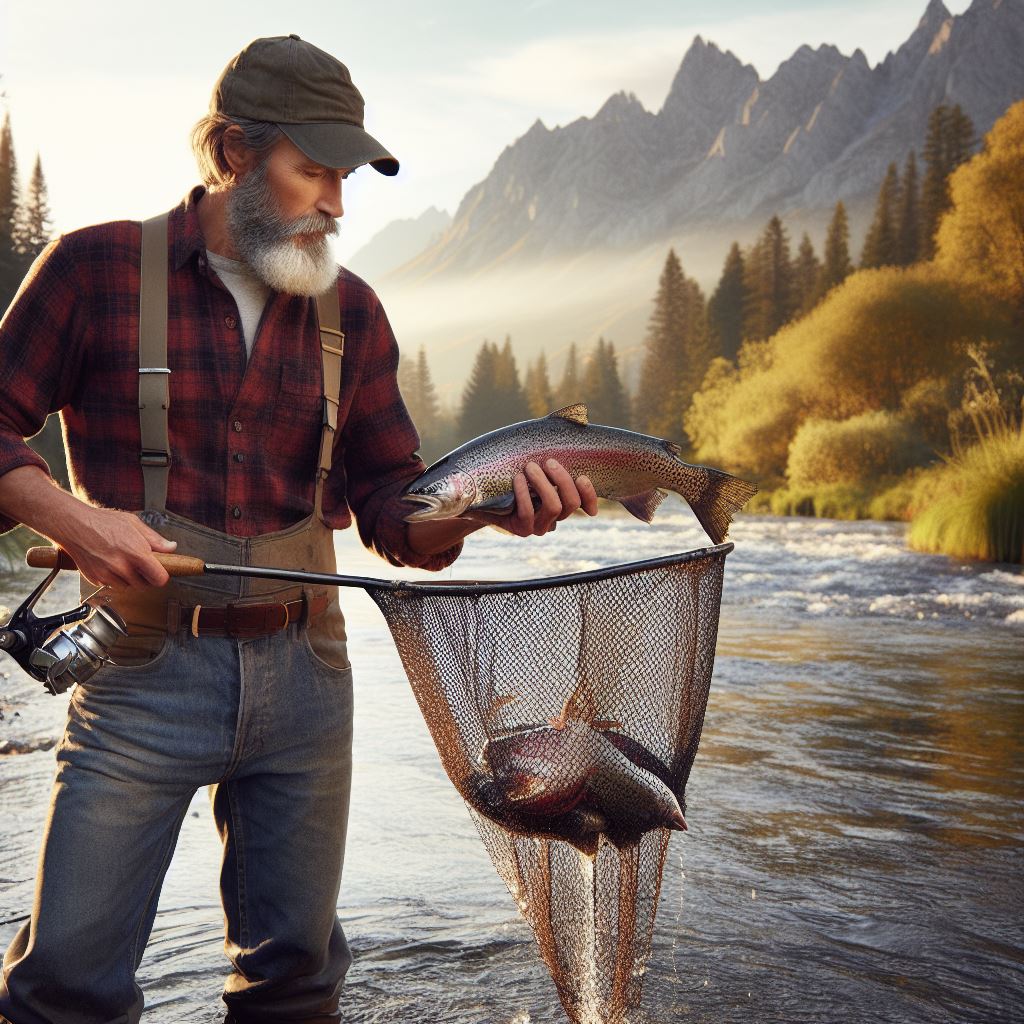Introduction
Fishing is not just a mere recreational activity; it holds deep-rooted cultural significance in American society.
From Native American tribes relying on fish for survival to the emergence of fishing as a popular pastime, this practice has woven its way into the fabric of American culture.
Since ancient times, Native American tribes recognized the vital role that fishing played in sustaining their communities.
Tribes like the Inuit, Pueblo, and Yup’ik developed intricate fishing techniques and rituals, highlighting the spiritual and communal importance of fishing.
These traditions have been passed down through generations, keeping the cultural significance of fishing alive.
As America expanded and commercial fishing became prominent, recreational fishing also gained popularity.
Fishing became more than a means of sustenance – it became a leisure activity for individuals and families alike.
The tranquility of spending a day on a boat or by the water, patiently waiting for the catch, has become a beloved American pastime.
Fish species themselves have become cultural icons.
The marlin, trout, and bass have gained widespread recognition, appearing on clothing, decals, and even as mascots for sports teams.
These fish have become symbols of nature, adventure, and the pursuit of personal challenges.
Furthermore, fishing has influenced other aspects of American culture, such as literature, art, and even cuisine.
Many celebrated authors, like Ernest Hemingway, have written about their fishing adventures, capturing the allure and excitement of the sport.
Artists have immortalized fishing scenes in their paintings, reflecting the tranquility and beauty associated with this activity.
From classic New England clam chowder to Southern-style catfish, the culinary world has embraced the flavors and traditions associated with fish.
Therefore, fishing’s cultural significance in American society cannot be overlooked.
From its deep roots in Native American traditions to its influence on literature, art, and cuisine, fishing holds a unique and significant place in American culture.
It has become a source of relaxation, inspiration, and connection to nature, shaping our cultural identity and way of life.
Historical Significance of Fishing in America
A. Early Native American fishing practices
- Native Americans employed various fishing techniques, including trapping, spearing, and netting.
- Fishing was an essential part of their culture, providing sustenance and spiritual significance.
- These practices were sustainable and respected the natural resources, promoting environmental harmony.
- Native American communities often had specialized individuals responsible for fishing and distributing the catch.
- Fishing was a communal activity, strengthening social bonds and fostering cooperation within the tribes.
B. Arrival of European settlers and their fishing traditions
- European settlers brought their own fishing traditions and techniques to America.
- The English, Spanish, French, and Dutch settlers each had distinct fishing practices.
- These traditions varied depending on the region and the settlers’ cultural background.
- European settlers introduced new fishing gear, such as nets, lines, and hooks, improving efficiency.
- The settlers’ fishing practices initially coexisted with Native American techniques, but conflicts arose over resource competition.
C. Development of commercial fishing industry in the 19th century
- The 19th century witnessed the rapid growth of the commercial fishing industry in America.
- New technologies, such as steam-powered boats and improved preservation methods, revolutionized the fishing industry.
- Large-scale fishing operations emerged, leading to the establishment of fishing ports and markets.
- Fishing became an integral part of the economy, providing employment opportunities and fueling trade.
- The industry faced challenges, including overfishing, environmental degradation, and conflicts with traditional fishermen.
D. Fishing as a means of survival and economic growth
- Fishing played a crucial role in the survival of early American colonists and frontier communities.
- It provided a reliable source of food and income, helping settlers establish self-sufficiency.
- As America expanded westward, fishing continued to contribute to the economic growth of coastal regions.
- Fisheries supported the growth of towns, attracting immigrants and stimulating local economies.
- Fishing also became a cultural symbol of independence, resilience, and the American spirit of exploration.
The historical significance of fishing in American society is multifaceted, deeply rooted in Native American traditions and influenced by European settlers.
Fishing has evolved from a cultural practice to a vital industry, contributing to the nation’s survival, economic growth, and cultural identity.
Transform Your Career Today
Unlock a personalized career strategy that drives real results. Get tailored advice and a roadmap designed just for you.
Start NowNative Americans’ sustainable fishing methods fostered spiritual connections with the environment and promoted communal values.
European settlers introduced new techniques and technology that boosted efficiency, leading to conflicts but also advancements.
The 19th century saw the rise of the commercial fishing industry, enabling the establishment of fishing ports and contributing to the country’s economy.
Fishing has continued to be a means of survival and economic growth, providing food and income for early colonists, frontier communities, and coastal regions.
Moreover, fishing is intertwined with the American spirit, representing independence, resilience, and exploration.
Understanding the historical significance of fishing in America gives us insight into the cultural fabric of the nation.
Read: Diverse Techniques: Traditional vs. Modern Fishing Methods
Cultural and Recreational Importance of Fishing
Fishing holds immense cultural significance in American society, extending beyond its purely utilitarian purpose.
From being a popular recreational activity to symbolizing American identity and serving as a part of various traditions and rituals, fishing plays a vital role in shaping the cultural fabric of the nation.
A. Fishing as a Popular Recreational Activity
Fishing serves as more than just a pastime; it is a fulfilling hobby that offers stress relief and a chance to escape the demands of daily life.
As individuals immerse themselves in the serenity of natural surroundings, their worries and anxieties dissipate, creating a sense of calm and tranquility.
Furthermore, fishing provides an opportunity for bonding with loved ones.
Whether it is spending quality time with family members or enjoying a fishing trip with friends, the shared experience strengthens relationships and creates lasting memories.
The simple act of angling together fosters a deeper connection and strengthens the social fabric.
B. Fishing as a Symbol of American Identity and Self-Reliance
Fishing evokes a connection to the frontier mentality ingrained in American history.
Just as early settlers ventured into uncharted territories, modern-day anglers explore lakes, rivers, and oceans in pursuit of the perfect catch.
This quest for exploration resonates with the pioneering spirit that defines America.
Moreover, fishing has been widely used in literature, art, and popular culture to depict American values such as independence and self-reliance.
The iconic image of a lone angler casting their line into the water symbolizes the resilience and determination that are emblematic of American society.
C. Fishing Traditions and Rituals within Different Communities
Fishing tournaments and competitions hold significant cultural importance.
Transform Your Career Today
Unlock a personalized career strategy that drives real results. Get tailored advice and a roadmap designed just for you.
Start NowThese events not only provide a platform for anglers to showcase their skills but also serve as a means of bringing communities together.
The camaraderie and shared enthusiasm fostered during these competitions build social bonds and promote a sense of belonging.
Additionally, fishing is deeply intertwined with religious or spiritual practices in various communities.
It is often seen as a sacred act, representing a connection between humans and nature.
Through rituals and ceremonies, fishing takes on a more profound significance, transcending its recreational aspect.
All in all, fishing goes beyond being a mere activity in American society.
It encompasses recreational dimensions, offering stress relief and facilitating bonding experiences.
Moreover, fishing acts as a symbol of American identity, embodying the spirit of exploration and reflecting cultural values.
Additionally, fishing traditions and rituals foster community bonds and add spiritual depth to the practice.
Thus, fishing holds a prominent place in the cultural landscape of the United States.
Read: The Role of Women in the US Fishing Industry

Economic Impact of Fishing in America
A. The fishing industry as a source of employment and income
The fishing industry in America plays a crucial role in providing employment opportunities and generating income for a vast number of individuals.
Not only does commercial fishing employ fishermen, but it also supports many related industries such as seafood processing and distribution.
The sale of fish and seafood contributes significantly to the national economy, making it an essential sector for economic growth.
Moreover, fishing creates jobs beyond the actual catching of fish, including boat manufacturers, gear suppliers, and marine equipment manufacturers.
The economic impact of these various industries combined makes the fishing sector a significant contributor to employment and income in America.
B. Tourism and recreational fishing’s contribution to local economies
Aside from the commercial aspect, tourism and recreational fishing have a substantial impact on local economies throughout America.
Many individuals travel from far and wide to enjoy the rich fishing opportunities available in various regions of the country.
Visitors often spend money on accommodation, dining, transportation, and other local services while engaging in recreational fishing activities.
This influx of tourism creates job opportunities in the hospitality and service sectors, benefiting local communities.
Transform Your Career Today
Unlock a personalized career strategy that drives real results. Get tailored advice and a roadmap designed just for you.
Start NowFurthermore, fishing tournaments and events attract participants and spectators, leading to increased economic activity and local revenue.
The economic benefits derived from tourism and recreational fishing enhance the overall financial stability of communities and regions.
C. Conservation efforts and sustainability in fishing for long-term economic benefits
To ensure the long-term economic benefits of the fishing industry, conservation efforts and sustainability practices are of utmost importance.
Overfishing and habitat destruction can negatively impact fish populations and disrupt the delicate balance of marine ecosystems.
By implementing conservation measures, such as fishing quotas and seasonal restrictions, we can regulate fishing activities and protect fish stocks.
Promoting sustainable fishing practices, such as using selective gear and promoting catch and release strategies, is also vital.
These efforts help preserve fish populations, maintain the quality of fishing grounds, and secure the industry’s long-term viability.
Investing in research and monitoring programs allows us to gather essential data for effective fishery management.
By focusing on long-term sustainability, we can protect the economic benefits that fishing brings while safeguarding the environment for future generations.
To sum it up, the economic impact of fishing in America is vast.
The fishing industry provides employment opportunities, income, and supports various related sectors.
Tourism and recreational fishing contribute significantly to local economies through increased spending and job creation.
Conservation efforts and sustainability practices are crucial for ensuring the long-term economic benefits of fishing while preserving the marine ecosystem.
By valuing and investing in the fishing industry, we can continue to enjoy its economic advantages while keeping our natural resources abundant and thriving.
Read: Impact of Climate Change on US Fishing Grounds
Environmental and Conservation Considerations
A. Challenges of overfishing and declining fish populations
- Overfishing and the depletion of fish populations pose significant threats to marine ecosystems.
- The demand for seafood has led to unsustainable fishing practices and a decrease in fish stocks.
- Overfishing disrupts the natural balance of ecosystems, causing a ripple effect on other species.
- Declining fish populations also impact the livelihoods of fishing communities and the economy.
B. Efforts to promote sustainable fishing practices
- Sustainable fishing practices aim to ensure the long-term viability of fish populations and ecosystems.
- Fishery management plans, such as catch limits and fishing permits, help control fishing activities.
- Implementing fishing gear modifications, like using selective gear, minimizes bycatch and ecosystem damage.
- Educating fishermen and consumers about sustainable seafood choices creates awareness and responsible consumption.
C. Role of fishing organizations and regulations in preserving aquatic ecosystems
- Fishing organizations play a crucial role in advocating for sustainable fishing practices and conservation efforts.
- They collaborate with scientists, policymakers, and communities to develop effective conservation strategies.
- Fishing regulations, such as seasonal restrictions and protected areas, help conserve vulnerable fish species.
- Monitoring and enforcing compliance with fishing regulations ensure the effectiveness of conservation measures.
- Public-private partnerships promote sustainable aquaculture practices, reducing pressure on wild fish populations.
Understanding and addressing the environmental and conservation considerations is crucial to preserving fishing traditions.
By tackling challenges like overfishing and promoting sustainable practices, we can protect aquatic ecosystems.
Fishing organizations and regulations play a significant role in safeguarding the cultural and ecological value of fishing in American society.
With collective efforts, we can ensure sustainable fishing practices for generations to come.
Read: Safety Protocols and Training for American Fishermen
Transform Your Career Today
Unlock a personalized career strategy that drives real results. Get tailored advice and a roadmap designed just for you.
Start NowConclusion
Fishing has a profound cultural significance in American society, representing a connection to nature and a way of life.
The economic and environmental aspects of fishing were explored, highlighting its impact on local communities and ecosystems.
Fishing remains relevant in shaping American culture and identity, as it continues to be cherished and celebrated across generations.
In closing, fishing in American society is more than a pastime; it’s a cultural cornerstone.
Reflecting a deep connection to nature, fishing transcends recreation, shaping traditions and values.
It symbolizes patience, resilience, and environmental stewardship, fostering a sense of community and family bonds.
As anglers cast their lines, they engage in a timeless ritual that bridges generations, fostering a shared identity.
This cultural tapestry, woven with tales of the big catch and the one that got away, mirrors the nation’s diverse landscapes and the spirit of exploration.
Beyond the pursuit of fish, fishing embodies a quest for solitude, introspection, and a profound connection to waterways.
It is a celebration of simplicity, where the rhythmic dance of the rod and reel becomes a meditative practice.
In closing, fishing is a living narrative, telling stories of American life and its intrinsic ties to the natural world.
As we cast our eyes upon the waters, we recognize that this age-old practice is not just a hobby; it’s a dynamic reflection of American culture, evolving with each ripple and casting a legacy that endures.
[E-Books for Sale]
The Big Book of 500 High-Paying Jobs in America: Unlock Your Earning Potential
$19.99 • 500 High-Paying Jobs • 330 pages
Explore 500 high-paying jobs in America and learn how to boost your career, earn more, and achieve success!
See All 500 High-Paying Jobs of this E-Book
1001 Professions Without a Degree: High-Paying American Jobs You Can Start Now
$19.99 • 1001 Professions Without a Degree • 174 pages
Discover 1001 high-paying jobs without a degree! Unlock career tips, skills, and success strategies for just $19.99!




